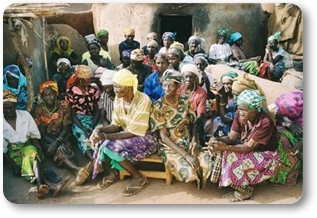Ghana: The 'Rational' vs 'Irrational' in Combat

 |
| Alleged witches at their refuge in Gambaga, Ghana |
Years ago, a similar killing would have been considered a normal thing. Currently however, there is a dramatic outcry against witchcraft-induced killing and intellectual face-off from Ministers, women organizations, the mass media, educationists, lawyers, human rights organizations, public and private institutions, and ordinary Ghanaians. The powerful Commission on Human Rights and Administrative Justice, among other institutions found “… the perpetrators of this atrocious crime as very barbaric and one that greatly dims the nation’s human rights record.”
Belief in witchcraft is a real danger to the survival of the African civilization. Mixed with poverty, it could be the end of Africans’ attempt to progress. Africans who believe in witchcraft do so with arbitrary rules and a hatred of freedom and rationality. Critical faculties are warped and that makes witchcraft believes rule supreme in the affairs of the African.
The murder of the old woman in Tema, a modern city that is supposed to intellectualize its denizens, as the German sociologist Georg Simmel would say, reveals the daunting task the enlightenment campaigners face toward Ghana’s and Africa’s progress. How do you rationalize an inhibiting cultural practice such as witchcraft that spans over thousands of years and won’t go away? The city that is supposed to show higher rationality has ceased to intellectualize. It has become irrational, hence the alleged old woman witch “set on fire by a group of five adults, one of whom is believed to be a pastor.”
The Tema incident overturns the Athenian thinker and mayor (of Athens) Pericles’ observations 2,500 years ago that “All good things flow into the City.” In the burning of the alleged witch to death, all bad things flow to the City, too. If the educated and the uneducated believe in witchcraft, who will solve the witchcraft problem?
Belief in witchcraft is intellectually and morally dangerous. It muddles the African mind, making it unmanageable. But the Ghanaian enlightenment thinkers are attempting to intellectualize it through human rights, equality, democracy, freedoms and the rule of law.
The nation-wide condemnation of the killing of the 72-year-old woman raises the contention between subjectivists (juju and marabout spiritual mediums, witch doctors, traditional powerbrokers, spiritualists) and the objectivists (police, courts of law, civil society, the mass media). The subjectivists believe that some people in their area claim to possess powers that identify witches, thus encouraging witch-hunting. The objectivists, who dismiss such gobbledygook, argue that they regret that the justice system in Ghana/Africa isn’t prosecuting the perpetrators to serve as a deterrent to others.
At the centre is the battle between irrationality and rationality. The irrational forces are ancient and think more with the superstition part of their brain. The rational forces think more with the objective part of their brain. The “irrationalists” who look at witchcraft from within the soul of the Ghanaian/African culture are in majority. The “rationalists” (or the realists) who gaze at witchcraft within the criminal justice system and locate witchcraft in the conditions of peoples' lives are in minority.
How do we solve the City of Tema’s witchcraft debacle? In the spirit of George Ayittey’s “African solution to African problem,” we have to look at other parts of Ghana to solve the Tema psychosis. The small town of Bongo, in Ghana's Upper East Region, readily comes to mind. To solve its witchcraft menace, the Bongo District Assembly has formed Justice and Security sub-Committees made up of the Police, Judiciary, Traditional Authority and some assembly members to sensitize the people about the dangers of believe in witchcraft to progress.
Bongo didn’t ask religious groups to help tackle its witchcraft problems. Why? Pretty much of the witchcraft belief is perpetuated by the religious groups, especially the spiritual churches that feed on superstitious Ghanaians’ spiritual insecurities most of which come from their culture and their poverty. Small Bongo will, therefore, be a good intellectual prescription to the big and wobbling Tema in how to solve the witchcraft pest.
